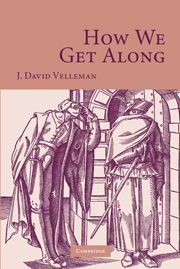1 - Acting
Published online by Cambridge University Press: 05 July 2015
Summary
My eventual topic will be what we philosophers call morality. In speaking of the moral as a distinct realm of thought and discourse, we trust that others will know what we mean, but in my experience, many people unschooled in philosophy have no idea. The reason, I suspect, is that what we call morality is no more than a family of patterns running through our way of life, held together by no more than family resemblances that only some people have been trained to recognize.
I want to explain how these moral patterns emerge from our nature as rational agents. I am going to argue that rational agency does not mandate these patterns, much less the individual actions of which they consist, but that it does induce them in our way of life, through a gradual and contingent process of collective practical reasoning. Before getting to that argument, however, I need to explain how rational agency works, and how it might give rise to something like morality, if not directly to morality itself.
When I eventually get to talk about morality, I won't have a lot to say about it. The main thing I have to say will be that there is not a lot for philosophers to say about morality – in any case, not as much as many philosophers have tried to say. I hope to make up the deficit by talking about many related things, starting now with action.
- Type
- Chapter
- Information
- How We Get Along , pp. 9 - 34Publisher: Cambridge University PressPrint publication year: 2009

